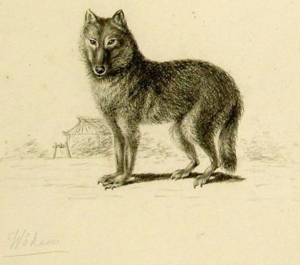Where and when did dogs arise? It’s one of the greatest mysteries of domestication, and one that remains unresolved despite decades of study.
Scientists know that all modern dogs descend from a population of gray wolves. But exactly who these wolves were and where they lived has been unclear. And thus, so has the origins of dogs.
Now, a new study of Japanese wolves may be providing some answers. This mysterious animal lived in Japan for thousands of years, but humans wiped it out about a century ago. In a new study, a team of Japanese researchers sequenced ancient DNA from nine Japanese wolves and 11 dogs, and compared them to the sequences of a variety of other canids. The data suggest that Japanese wolves are more closely related to dogs than are any other wolves. More importantly, the DNA suggests that the ancestor of the dog and the Japanese wolf was the same: A population of gray wolves that lived in East Asia, and which has likely vanished.
In all, the study suggests that dogs arose in East Asia, though the timing is still unclear. The location jibes with two proposed locations of dog domestication: Northeastern Siberia and Southeast Asia. It also seems to rule out a European or Middle Eastern origin, which some researchers had posited.
More work will be needed to seal the deal, and to say whether this is one canine case that’s finally been closed.


